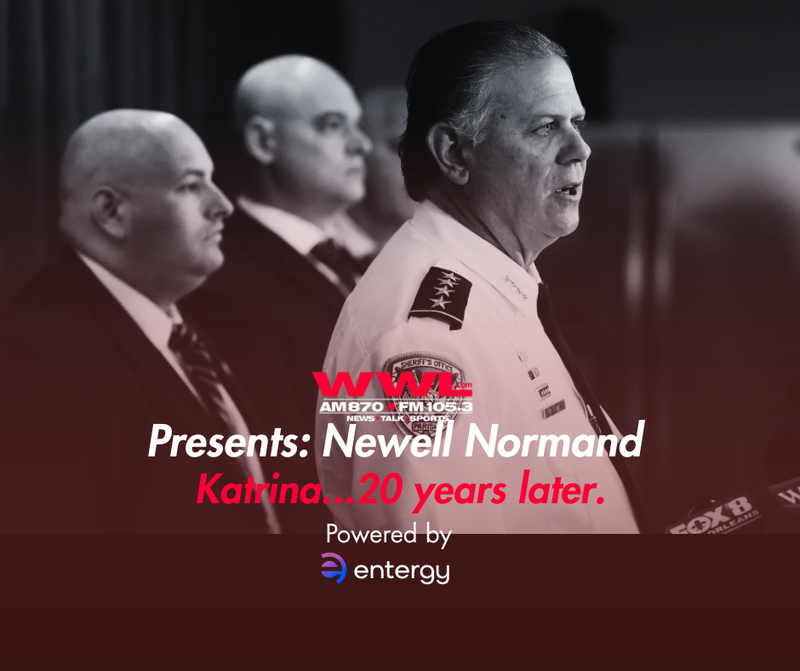
Newell Normand wasn’t with WWL when Hurricane Katrina hit. Nor was he Sheriff of Jefferson Parish. At the time, he was a Criminal Deputy of Jefferson Parish. And after August 29th, 2005, he was in charge of managing the East Bank in the aftermath of the storm.
WWL New Director Dave Cohen sat down with Normand for the station's 20th anniversary special on Hurricane Katrina to collect his memories of his experience instituting rescue plans, helping to form the Cajun Navy, and working with FEMA, Louisiana State Police, and the National Guard to make progress after one of the worst disasters in American history unfolded.
One of Normand’s first recollections was attempts to place massive strings of red tape around rescue efforts being strung together after the storm. One successful effort was the formation of the Cajun Navy.
Newell recalls, “There was a lot of resistance from FEMA. They wanted to conduct safety inspections of all of these boats before conducting rescues…And we had major points of disagreement with them. And it ended up as a real significant pissing match.”
While New Orleanians cried for help from their rooftops, Normand says, at the top, there was nothing but conflict.
“There was conflict between the parish officials and the sheriff's office. There was a conflict amongst all of us in FEMA. There were conflicts amongst a lot of the parish folks in the state EOC. There was a conflict with the governor's office. There was a conflict with the Coast Guard. There was a conflict after conflict because of the pressure from Washington,” says Normand.
The bulk of the pressure, according to Normand, was from the White House to control the media narrative and hide the tragedy and carnage taking place in the Gulf South.
“It was just horrible seeing folks on balconies and on rooftops and the Superdome and the UNO assembly center. And, you know, there's no food, there's no water, there's no electricity, there are no bathrooms. You got people defecating in the middle of a field, and here and there and everywhere else. And people dying,” says Normand. “It was this constant conflict of trying to move this to get off the news.”
One of the most tense moments in the days following Katrina was a standoff with FEMA and Louisiana State Troopers, when Normand decided to shut down FEMA’s attempt to use Louis Armstrong Airport as an emergency safety center.
“I'm the head of the law enforcement detachment there. I have 14 guys at the airport. We probably had about 700-800 people there. No electricity, no running water, no bathrooms. We had several suicide attempts. We were taking guns and weapons,” Newell recounts.
“FEMA calls this meeting—it's the airport officials, me, and FEMA officials. The guy walks in and says we're going to institute plan ABCD…I go, ‘What is that?’ And he goes, ‘Well, that represents each concourse. We're gonna bring everybody to the dome at UNO Assembly Center, and we're gonna bring them here and put them on the concourses.”
Newell explains that part of the purpose behind using the airport was to hide vast numbers of refugees from the media.
“We were going to lock down the facility so the media couldn't see them,” explains Normand. “If you recall, the media could not get into the airport. There was a media staging area out front… but that was the goal to get them out from under the television camera. It ended up being a very heated conversation. And the guy from FEMA wouldn't back down.”
After hearing the plan, Normand realized that bringing more people to the airport would cause nothing but more chaos and potentially more deaths.
“I told them that there would be no ABCD plan until they could guarantee sorties. They can guarantee we're gonna get food, and they can guarantee that we're going to get water. I said, ‘This can't happen until we restore power here. And we're not gonna be able to do this in the manner in which you want to do it,’” says Normnad. “So we shut the airport down; it's not happening.”
Word of his decision travelled fast.
“I get a call from Jim Letten, US attorney, who's at the EO,” recalls Normand. “He says, ‘Newell, what's going on at the airport?...they're talking about sending state troopers down there to arrest you.’”
I said, ‘Tell them to bring it on. But let me tell you something, Jim. In the interim, I've got 20 to 30 national and international news stations, not 300 feet from where I'm standing right now. I will hold a press conference, and I will tell the world exactly what's going on here and what these numbskulls and Baton Rouge intend to do.’”
“We'll see who's gonna win this battle because y'all are providing nothing for anybody down here, and these people are dying,” Normand recalls saying. “That's how it was almost every day for about 14, 15 days.”

